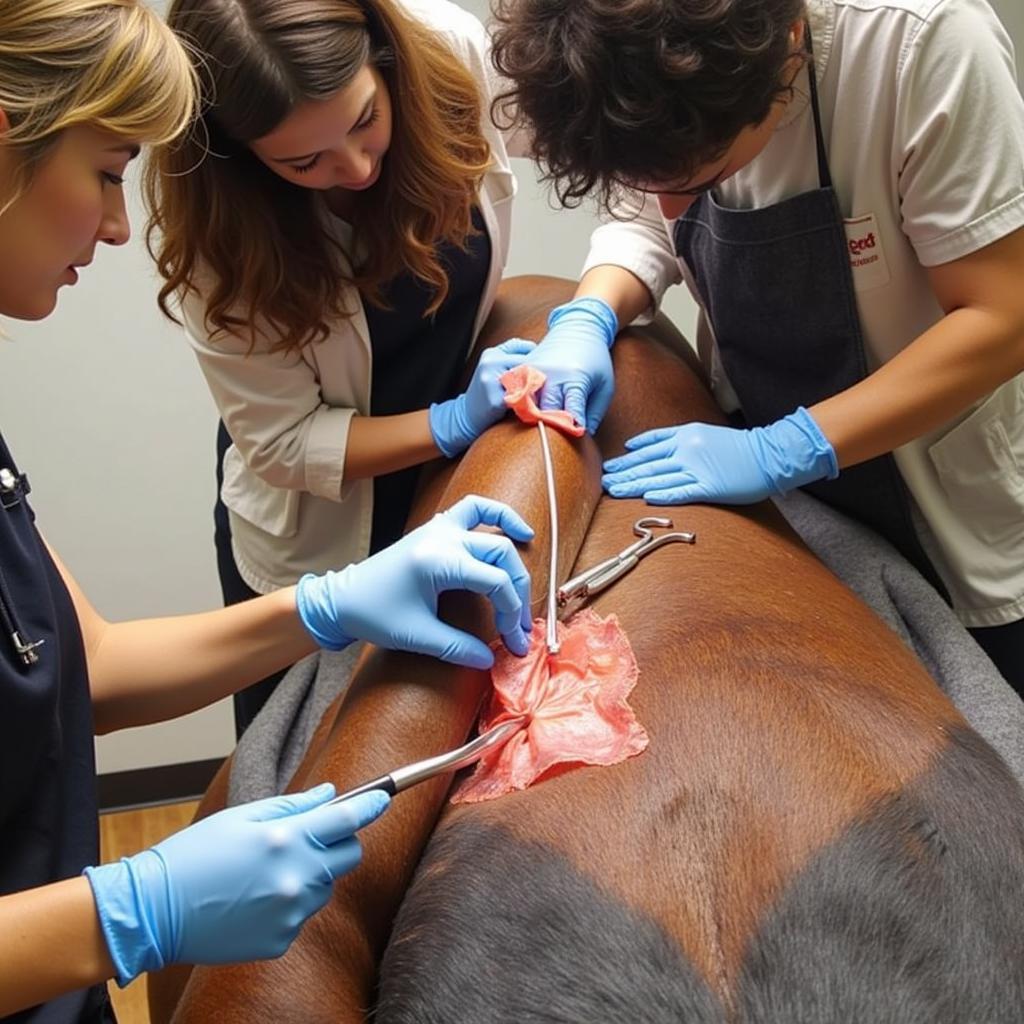Horse Hernia Surgery Cost is a significant concern for horse owners facing this medical issue. Hernias in horses can range from minor inconveniences to life-threatening emergencies, and understanding the factors influencing the overall cost is crucial for making informed decisions. This article delves into the various aspects of equine hernia surgery, from diagnosis to recovery, and breaks down the associated costs to help you prepare for this potential expense.
Types of Hernias and Diagnosis
Equine hernias are broadly categorized into umbilical hernias, inguinal hernias, and abdominal hernias. Umbilical hernias, common in foals, occur near the navel. Inguinal hernias are more prevalent in stallions and involve the groin area. Abdominal hernias, less common, can result from trauma and appear anywhere on the abdominal wall. Diagnosis typically involves a physical examination, and sometimes ultrasound or other imaging techniques are necessary to determine the extent of the hernia. The type and severity of the hernia play a significant role in determining the horse hernia surgery cost.
Accurate diagnosis is critical for determining the appropriate treatment and associated costs. A veterinarian will assess the size, location, and contents of the hernia to decide whether surgical intervention is necessary.
Factors Influencing Horse Hernia Surgery Cost
Several factors contribute to the overall cost of horse hernia surgery. Geographic location can significantly impact veterinary fees, as prices vary across different regions. The complexity of the surgery also plays a role. A simple umbilical hernia repair in a foal is typically less expensive than a complicated abdominal hernia repair in an adult horse. The surgeon’s experience and reputation can also influence the cost, with more experienced surgeons often charging higher fees. Finally, post-operative care, including medications, hospitalization, and follow-up visits, adds to the total expense.
The cost of pre-operative diagnostics, such as blood work and imaging, should also be factored into the overall horse hernia surgery cost.
Surgical Procedure and Post-Operative Care
The surgical procedure for hernia repair varies depending on the type and location of the hernia. Umbilical hernias in foals are often repaired using a simple suture technique, while more complex hernias may require mesh implants or other specialized procedures. Post-operative care is essential for successful recovery. This typically involves pain management, antibiotics to prevent infection, and stall rest to allow the surgical site to heal.
 Horse Hernia Surgery Procedure
Horse Hernia Surgery Procedure
Minimizing Complications and Long-Term Prognosis
Proper post-operative care is vital for minimizing complications and ensuring a positive long-term prognosis. Complications such as infection, swelling, and recurrence of the hernia can occur, potentially increasing the overall horse hernia surgery cost. Strict adherence to the veterinarian’s instructions regarding wound care, exercise restriction, and medication administration is crucial for a smooth recovery.
“Early diagnosis and prompt surgical intervention are often key to a successful outcome in equine hernia cases,” advises Dr. Emily Carter, DVM, a renowned equine surgeon with over 20 years of experience. “While cost is a concern, delaying treatment can lead to more serious complications and ultimately increase expenses.”
What is the Average Horse Hernia Surgery Cost?
While providing an exact figure is challenging, horse hernia surgery costs can range from a few hundred dollars for simple umbilical hernia repairs in foals to several thousand dollars for complex abdominal hernia repairs in adult horses. It’s crucial to discuss the anticipated costs with your veterinarian before making any decisions.
Conclusion
Understanding horse hernia surgery cost involves considering various factors, from the type and complexity of the hernia to the geographic location and surgeon’s fees. While cost is a valid concern, prioritizing your horse’s health and well-being is paramount. By working closely with your veterinarian and understanding the factors influencing the overall cost, you can make informed decisions and ensure the best possible outcome for your equine companion. Horse hernia surgery cost should be seen as an investment in your horse’s health and future.
FAQ
- What are the signs of a hernia in a horse?
- How is a hernia diagnosed in a horse?
- What are the different types of hernias in horses?
- What is the recovery time for horse hernia surgery?
- What are the potential complications of horse hernia surgery?
- Can hernias in horses be prevented?
- How can I find a qualified equine surgeon in my area?
“Prevention is always better than cure,” states Dr. James Miller, Equine Specialist. “Regular veterinary checkups can help identify potential problems early, minimizing the need for costly interventions down the line.”
Need further support? Please contact us: Phone: 0772127271, Email: [email protected] or visit us at: QGM2+WX2, Vị Trung, Vị Thuỷ, Hậu Giang, Việt Nam. We have a 24/7 customer service team ready to assist you.